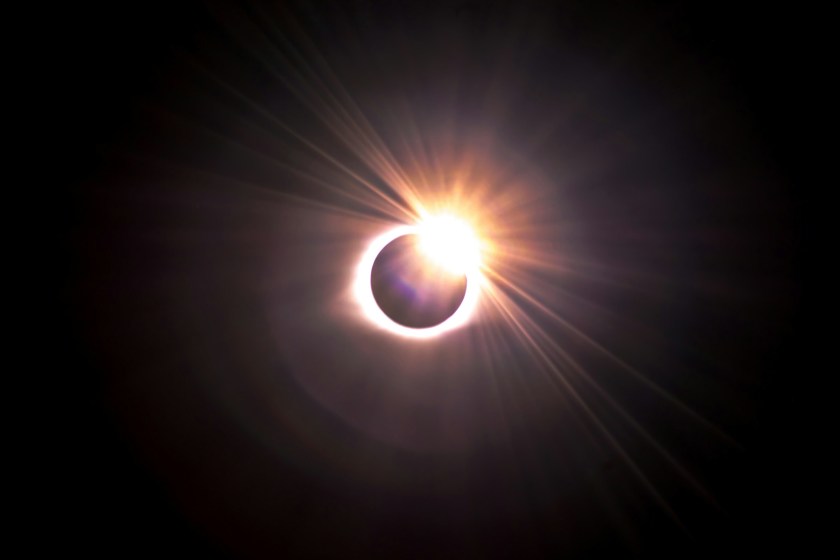50% OFF a Complete Pair of Glasses
*Restrictions apply. Click here for details.

Your Guide to Protecting Your Sight During the 2024 Solar Eclipse
Written by Dr. Elaine Ramos, OD, Nationwide Vision
We're on the brink of experiencing an extraordinary sky spectacle – the Solar Eclipse on April 8th, 2024. This event will showcase the Moon as it crosses in front of the Sun, casting a temporary shadow. In some parts of the United States, viewers will be treated to the complete darkness of totality, while in other areas, the Sun will only be partly covered by the Moon.
Safety should be our top priority! Before you gaze upwards, it's crucial to understand the safest ways to observe the eclipse. Following the right safety measures and being aware of the dangers are key. Dr. Elaine Ramos, O.D., an expert optometrist with EyeCare Partners, is here to offer her expert advice on protecting your eyes while enjoying the solar eclipse. Before taking part in this exciting celestial event, you need to make absolutely sure that you are using the appropriate equipment to keep your eyes safe. Not taking the proper steps could put your eyes at risk for permanent damage.
Understanding the Potential Vision Risks of Watching a Solar Eclipse
Under typical conditions, the Sun emits light that is far too bright for safe direct observation with the naked eye, and attempting to do so, even while wearing polarized sunglasses, can lead to severe eye conditions such as solar retinopathy. When you stare at the Sun, you are placing the center of your vision, the fovea, directly into the light’s path. The Sun’s intense light then causes damage to the fovea and surrounding retinal cells, causing blurry vision or even loss of central vision.
The danger doesn't diminish during a solar eclipse; in fact, it may even increase. While the Moon does cover a portion of the Sun, the filtered sunlight can still be extremely harmful, particularly during the total phase of the eclipse when the Sun is nearly fully covered but its remaining rays are incredibly intense. Another name for solar retinopathy is actually eclipse retinopathy because of how dangerous this event is on the eyes. So even if it seems like the light isn’t as bright, the light that still makes it to your eyes is just as intense as any other day. This is why staring directly at the solar eclipse without any protection is going to place your eyes at a significant risk for damage.
For information on the extent of the Sun's coverage in your specific area during the eclipse, you can use tools like the Eclipse Cities tracker.
Safe Viewing Practices for the 2024 Solar Eclipse
Witnessing a solar eclipse is a once-in-a-lifetime event that should be approached with caution to avoid damaging your eyes. There are multiple safe methods to observe the eclipse while protecting your vision.
Use Certified Solar Eclipse Glasses
For a direct view of the solar eclipse, it's crucial to use glasses specifically designed for this purpose. Solar eclipse glasses block out more than 99.999% of the sun's rays, making it safe for you to watch the eclipse. Make sure the glasses you use meet the ISO 12312-2 standard for solar viewing. The American Astronomical Society has a list of trusted vendors from which you can get these vital protective glasses.
Attend Events at Observatories
Observatories often organize special events during solar eclipses, offering educational and safe viewing opportunities. If you live near an observatory, look into their plans for eclipse day. They may provide eclipse glasses or have live feeds of the eclipse on display, ensuring a safe viewing experience for everyone, regardless of their location relative to the path of totality.
Craft Your Own Eclipse Viewer
If you cannot acquire eclipse glasses or visit an observatory, creating your own Sun Viewer is a creative and secure option. This homemade device allows for indirect viewing by projecting an image of the sun onto a surface inside the box, functioning similarly to a pinhole projector but with the possibility of a larger image. This DIY method offers a safe alternative to directly observing the eclipse, making it possible to enjoy the event from anywhere.
Protect Your Eyes While You Experience the 2024 Solar Eclipse
As we look forward to this spectacular celestial event, it's essential to focus on safety to make the experience both memorable and safe. Considering it will be twenty years before the next solar eclipse is visible in the United States, it's critical to take steps to protect your eyesight. With adequate preparation, you can ensure a safe viewing, avoiding any emergency visits to the eye care professional.
About the Author: Dr. Elaine Ramos, OD

Dr. Elaine Ramos, OD, received her Bachelors of Science degree from California State University, Fullerton and earned her Doctorate of Optometry from Marshall B. Ketchum University. She completed a residency in vision therapy and neuro-rehabilitation from the State University of New York College of Optometry.
Prior to joining Nationwide Vision, Dr. Ramos was an assistant professor at Western University College of Optometry in Pomona, CA and adjunct professor at Midwestern University in Glendale, AZ where she practiced in the pediatrics and vision therapy clinics. She currently resides in Peoria, AZ with her husband, baby girl, and corgi named Butters.

 316-636-2010
316-636-2010 316-609-2177
316-609-2177